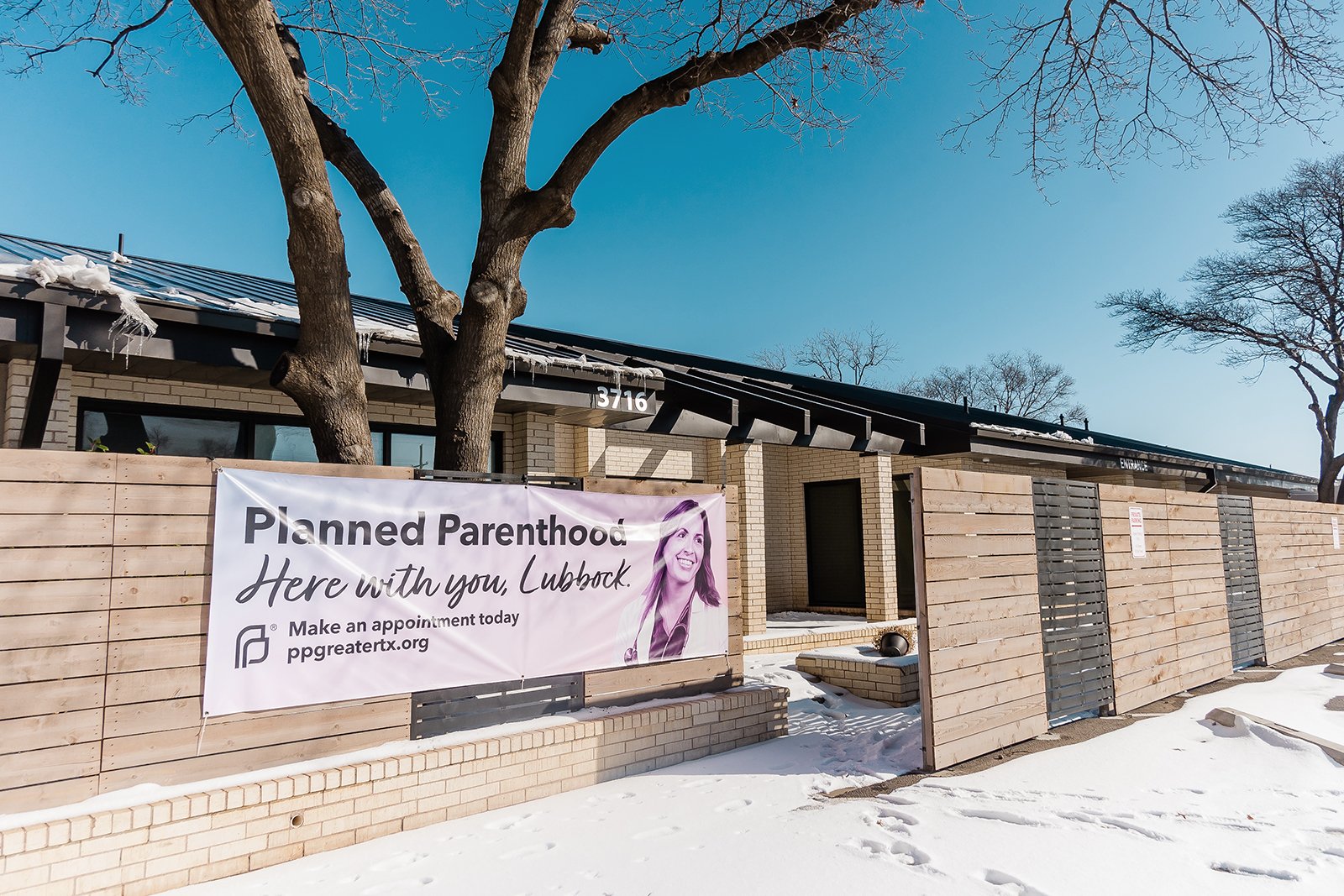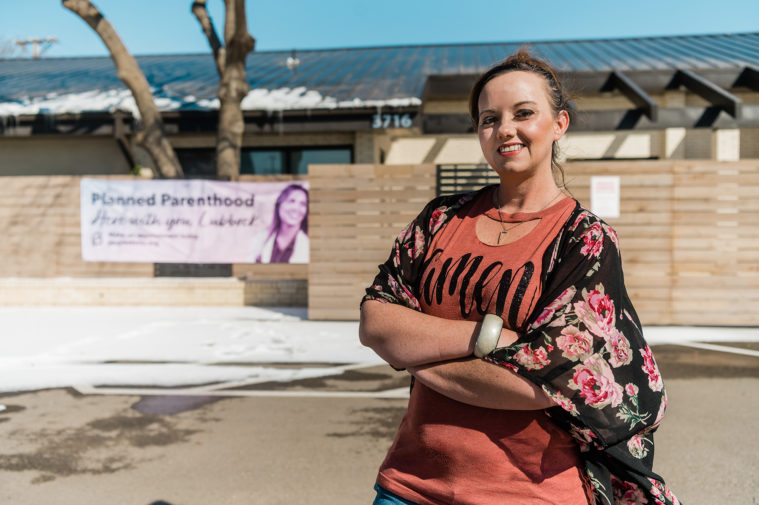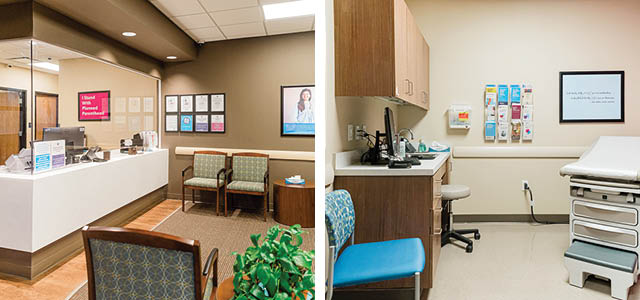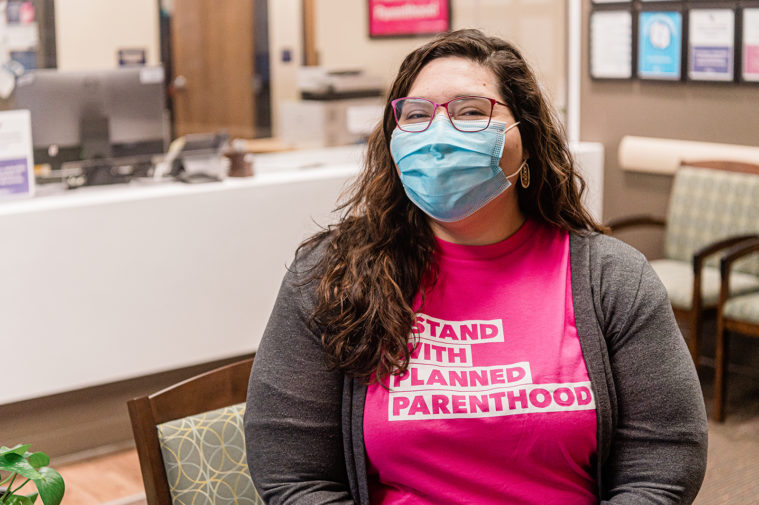In an effort to defund Planned Parenthood, state leaders have dismantled Texas’ reproductive health care safety net over the last decade. This fall, the provider reopened a clinic in a mostly rural, Republican part of the state.

By Kaysie Ellingson and Sophie Novack
March 2, 2021
This story was published in partnership with Texas Tech Public Media, the NPR and PBS affiliate in Lubbock.
It was a frigid October morning in the West Texas city of Lubbock as Shelley Woodbridge drove carefully over the thick black ice that covered roads; the coldest day in months, by far. Woodbridge, a single mother, criss-crossed town to drop her three young kids off at different schools. Just before 11 a.m., she turned onto 22nd Place in the city’s Medical District, and thought about the periwinkle dress she had on—her favorite. “I shouldn’t have worn this today,” she thought. “What if someone throws blood on me?”
Woodbridge was the first patient at the new Planned Parenthood clinic in Lubbock—a return of the reproductive health care provider here for the first time since state budget cuts and anti-abortion regulations forced it to shutter in 2013. Legislative restrictions closed dozens of family planning and abortion clinics across the state nearly a decade ago, leaving many Texans, especially low-income and rural residents, without access to care. Few have reopened. For now, the Lubbock clinic offers health services including cancer screenings, contraception, STD testing, and more. The plan is to offer abortions beginning in 2021, but a start date hasn’t been set. Lubbock, located in a predominantly rural, Republican part of the state, is one of the first places to see a Planned Parenthood return. The reopening has already caused a backlash in the conservative college town.

As Woodbridge pulled into the parking lot, she chuckled to herself. It was empty. She didn’t know what she was expecting. Screaming protestors flanking her as she entered, maybe. A few days earlier, demonstrators had lined the sidewalk outside the clinic. In the parking lot, Woodbridge warmed her hands against the car heater and pulled on a burgundy sweater before hurrying to the front door of the low-slung beige brick building. A security guard buzzed her in.
The clinic was quiet. Staff led Woodbridge down the hallway to a room with big windows and a bright fuschia wall before her annual exam, which included a pap smear and breast exam. The last time Woodbridge, who is uninsured, had a checkup was when she was pregnant with the youngest of her three children, who is now 4 years old. Her kids have health coverage, but at the age of 33, with no pre-existing conditions, Woodbridge says insurance for her would cost thousands of dollars a year—an amount she can’t afford.
Woodbridge works as a realtor and says her income is unpredictable, fluctuating each month. Instead of paying for insurance, she’s relied on Google as her primary medical resource, and paid for doctor visits out of pocket when necessary. When she needed birth control to help manage her hormones, the doctor visit just to get a prescription would have cost $700, she says. So instead, she ordered the pills online, hoping for the best. “I think that’s the typical mom lifestyle,” she says. “We put ourselves last.”
Access to reproductive health care is limited statewide, but especially in vast, mostly rural West Texas. Lubbock, a city of around 260,000 that also serves as a medical hub for people in surrounding counties, has largely been without dedicated family planning providers in recent years. For the 15 percent of residents who are uninsured, options for affordable reproductive health care are even more scarce due to years of budget cuts by elected officials. Few publicly funded family planning clinics remain in the region. There are just three providers in the 41 counties that comprise the Panhandle and South Plains regions that are part of the federally funded Title X family planning program. The two federally qualified health centers in Lubbock, which provide a range of primary care services, sometimes have weeks-long waits for appointments. After the Lubbock center closed in 2013, there were no Planned Parenthood facilities left in the western half of the state. And for the last seven years, Lubbock residents seeking an abortion have had to travel at least 300 miles one-way to the closest provider in Fort Worth, one of the longest distances from any city in the country.
“There are very few communities that can say they have adequate, affordable, and accessible women’s health care,” says Katherine Wells, director of public health for the City of Lubbock. “In Lubbock, women are diagnosed with late-stage breast and cervical cancer, there are high rates of STIs, and there are unplanned pregnancies. Increased access to women’s health care can improve these rates.”
In 2018, Planned Parenthood announced plans to open two clinics in West Texas, citing a dearth of services in the region. Barred from state funding streams, the organization launched a $16 million fundraising campaign for the expansion, with private donations going towards running the health centers and helping to subsidize care for uninsured patients, says Sarah Wheat, chief external affairs officer for Planned Parenthood of Greater Texas. In October of 2018, Planned Parenthood returned to El Paso, which had been the largest city in the country without a clinic after the last one closed in 2009. Last July, Planned Parenthood announced it would open a Lubbock clinic, though the location and timing were not released for security reasons. But after “monitoring” the old clinic location, local anti-abortion activists identified the new address and shared it, along with photos, in a mass email through the statewide anti-abortion group Texas Right to Life in mid-October. Planned Parenthood opened its doors just a few days later.
Before the old Planned Parenthood clinic closed in 2013, Woodbridge was a patient. It was there that she found out that she was pregnant at age 19. Recently married and not ready to have a baby at the time, she sobbed in the exam room but remembers the nurses comforting her. After Planned Parenthood announced its opening last year, Woodbridge says she scheduled an appointment online right away. She cried, again, when clinic staff told her how much she owed at the end of her visit: $0.
While she identifies as “very pro-life,” Woodbridge says many people ignore the other critical services the organization provides, beyond abortion. “I do firmly believe that life occurs at conception. But with that said, every life matters, including mine,” she says. “As women, we find it so hard to say that, hey, I matter, I’m worth it. I’m worth getting checked out.”
*
In mid-November, as Lubbock faced its worst COVID-19 surge yet, city hospitals ran out of beds, and public health officials pleaded with residents to avoid gatherings, hundreds of people crowded into the downtown Citizen Tower, as local officials considered making Lubbock a “sanctuary city for the unborn.”
Outside the government building, a man stood on a slab of cement, microphone in hand. “We’re just here to pray over the people who are making decisions on the lives of little babies today,” he told the group in front of him. Nearby, a handful of people held signs supporting Planned Parenthood. “Pro-Sex Ed, Pro-Birth Control, Pro-Science, Pro-Choice!!!” read one. A man knelt a few feet in front facing them, his arms outstretched, praying.
Lubbock is one of dozens of Texas municipalities to consider adopting a “sanctuary city” ordinance that seeks to ban abortion within city limits. As written, the edict would allow family members of an aborted fetus to sue the abortion provider, or anyone who assisted the mother with obtaining the procedure, for emotional damages. This could include a person who helped pay for the abortion or even provided transportation to the appointment. Mark Lee Dickson, an anti-abortion activist from East Texas who began traveling town-to-town to push these ordinances in 2019, says he hadn’t intended to focus on Lubbock until he heard about Planned Parenthood opening there last year. None of the 19 Texas communities that have so far passed such a measure have an abortion provider. The largest city to do so, Big Spring, has one tenth the population of Lubbock.

After a seven hour hearing in November, city council members unanimously voted down the anti-abortion ordinance, citing concerns that it flies in the face of federal law and would open the city to legal challenges. But the measure will now go to a public vote in a May 1 election.
“One of the reasons why ordinances like this one are so harmful is that they’re confusing people about what their rights are,” says Anjali Salvador, who challenged the ordinances last year as a staff attorney with the American Civil Liberties Union (ACLU) of Texas, and now serves as policy counsel at the National Institute for Reproductive Health. “Abortion is still a constitutional right everywhere—every state and every city.”
Planned Parenthood is consulting with attorneys in the event that the ordinance passes in Lubbock in May, Wheat says. Legal experts have said that the measures are likely unenforceable, and at least seven other Texas towns have declined to pass them for that reason. Lawyers hired by the City of Lubbock last fall advised city officials that the proposed ordinance “is void because it conflicts with, and therefore is preempted by, state law.”
This has not deterred supporters of the ordinance, however. In September, Lubbock’s state Senator Charles Perry, a Republican who has been pushing the anti-abortion ordinance along with Dickson, held a gathering inside a packed Lubbock church to discuss the topic. He stood on a stage lit by purple lights, between a handful of pastel-colored teddy bears and a Bible verse projected on the wall behind. “We have an opportunity today as a community and as a city,” he said, “to push back on one of the darkest times of our country’s history.” A line of supporters—one woman and more than a dozen men—stood in back of him, none wearing face masks. Perry, like Dickson, loudly rejects the 1973 U.S. Supreme Court decision legalizing abortion nationwide: “Roe v. Wade is not a constitutional right. It’s common law,” he said to applause. “I hear, ‘It’s a state issue, it’s a federal issue.’ All that is just half-truths, meant to distract and distort what’s reality: It’s God’s truth. That’s all that really matters in this.” About the ordinance, Perry said, “This will not come without a battle. It’ll come not without casualties.”
In an effort to defund Planned Parenthood, Texas leaders have successfully dismantled the reproductive health care safety net across the state. In 2011, conservative legislators cut the state’s family planning budget by two-thirds; more than 80 clinics, or one in every four, shuttered or stopped providing these services. Two years later, they kicked Planned Parenthood and other abortion providers and their affiliates out of the state’s low-income women’s health program. The approach was “like a sledgehammer on a thumbtack,” says Planned Parenthood’s Sarah Wheat. Taxpayer dollars are already barred from paying for abortions. Instead, the state’s move blocked contraception access, cancer screenings, and other preventive health services, shuttering dozens of clinics, the majority of which were not Planned Parenthood facilities. Tens of thousands of Texans lost access to care in the state with the highest uninsured rate among women of childbearing age.
Researchers at the University of Texas at Austin found that after Planned Parenthood was excluded from the women’s health program, use of the most effective, long-lasting forms of birth control dropped by about a third, and the number of births among poor women on Medicaid increased.
Then, in 2013, the Texas Legislature passed House Bill 2, a sweeping anti-abortion bill that required doctors performing abortions to have admitting priviledges at a nearby hospital and that abortion clinics meet the requirements of ambulatory surgical centers, among other restrictions. That September, Angela Martinez, then the clinic manager for the Planned Parenthood in Lubbock, wrote a brief in a legal challenge to the law that argued it created an unconstitutional undue burden on abortion access. The clinic would not be able to comply with the admitting privileges requirement, she wrote, in part because the physician who provided abortions there flew in from Houston once a week for two days at a time. According to Martinez, anti-abortion protestors “harass health center employees every day,” including by shouting insults, taking photos and license plate information, and protesting at their homes. “I cannot imagine a local physician being willing to risk his or her safety in this way,” she wrote. Most of the patients seeking an abortion there were low-income, and already many had to travel more than 100 miles from across the region to get there.
The clinic soon closed, a casualty of both family planning cuts and HB 2. “Every other year was just constant funding cuts and more restrictions,” Martinez says. Planned Parenthood facilities in at least a dozen parts of the state closed and never reopened, including in other West Texas cities like Midland, Odessa, San Angelo, and Abilene.
In the months after HB 2 was passed, about half of the abortion clinics statewide shuttered. Researchers found that in Texas’ 254 counties, the number of abortion facilities declined from 41 across 17 counties in 2012, to just 21 in six counties in 2014.
In 2016, the U.S. Supreme Court struck down most of HB 2. But just a small handful of clinics have reopened since, mainly in major metro areas. “Once the clinic is closed, your staff is gone, you’ve given up your lease, you’ve sold your medical equipment, you’ve let your licenses expire,” says Wheat. “The reality is, in many, many, communities like this, family planning clinics have never reopened. And those clinics that provide abortions, with a few exceptions, have really not reopened.”
*
Since opening its doors in October, Planned Parenthood in Lubbock has been able to see as many as 18 patients a day between telehealth and in-person visits, says Angela Martinez, who returned to the job of clinic director. People have travelled from Brownfield, Canyon, Plainview, even Amarillo, nearly two hours north, for appointments.

Meanwhile, Texas lawmakers, who meet every two years, have continued efforts to eliminate Planned Parenthood in recent sessions, kicking it out of the breast and cervical cancer screening program for low-income Texans in 2015; banning private insurance from covering abortions, including in cases of fetal anomaly and rape in 2017; barring partnerships with local governments on programs related to teen pregnancy prevention, sex education, HIV testing, and more in 2019. At the beginning of February, the state was poised to kick Planned Parenthood out of Medicaid, following a five-year court battle. A judge intervened at the last minute, setting a hearing for mid-February. The move is now on hold at least until early March. With a new conservative U.S. Supreme Court, Republican lawmakers in Austin have filed bills this year to outlaw abortion at six weeks and to trigger a complete ban in the event that state or federal laws change.
For Shelley Woodbridge, the backlash to Planned Parenthood in her town is personal. “At the end of the day, it’s just crazy to hear how black and white people make these issues,” she says. “If every life truly matters, then the life of the person making their choice matters.”
Ahead of her October visit, Woodbridge posted about her Planned Parenthood appointment on Facebook. “I’m pro-education, pro-prevention, and lastly pro-self care,” she wrote. “I am pro-life BUT I’m only the captain of this uterus, I don’t have a say in what you do with YOUR uterus.” Woodbridge says she got some supportive messages, and pushback, as she expected.
“It was predominantly men in my inbox, which—oh man, nothing gets me heated like a man who doesn’t have a uterus to tell me how to run mine,” she says, laughing.







